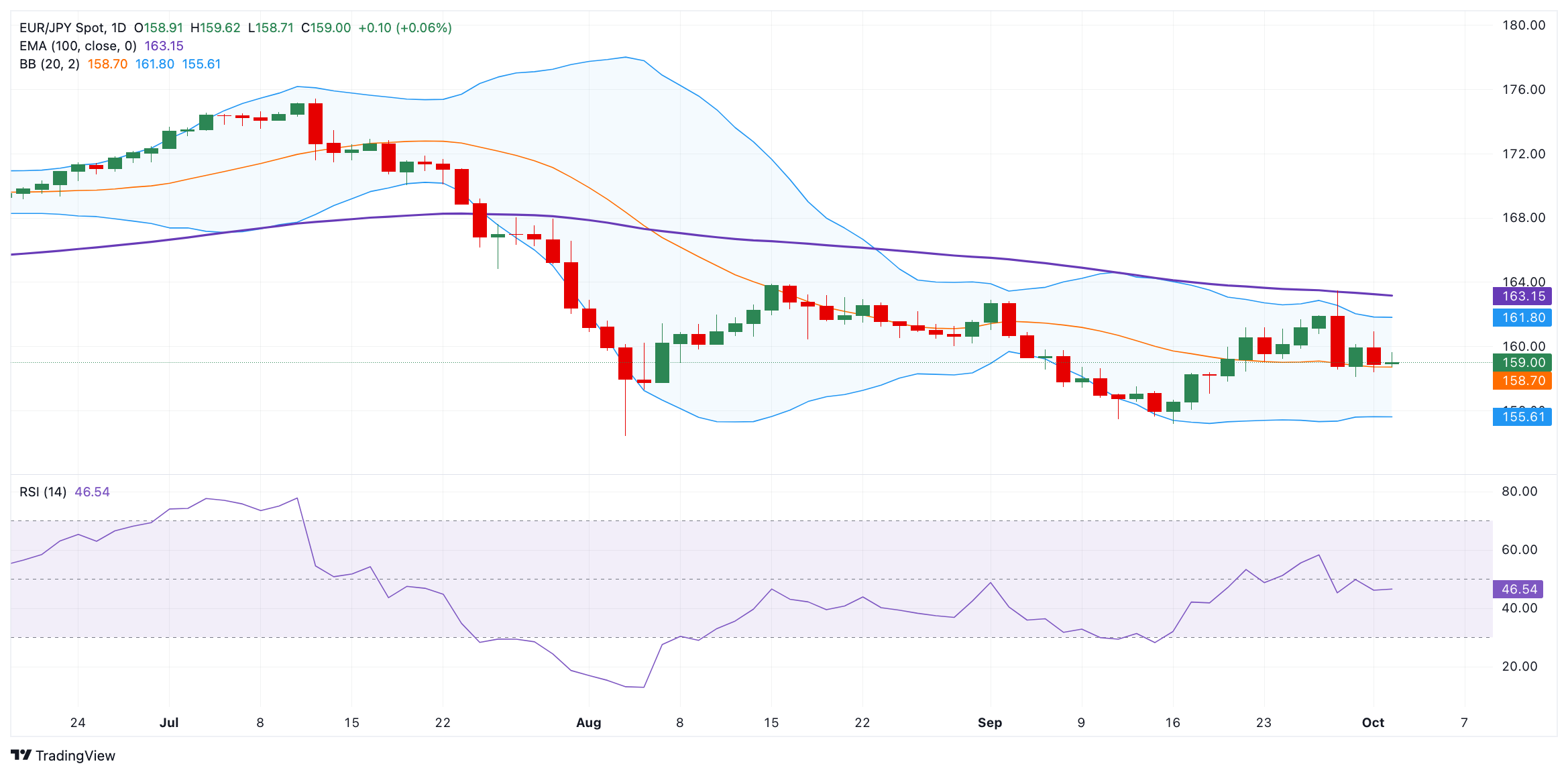- Analytics
- News and Tools
- Market News
- EUR/JPY Price Forecast: Bearish outlook remains intact below 159.00
EUR/JPY Price Forecast: Bearish outlook remains intact below 159.00
- EUR/JPY weakens to near 158.80 in Wednesday’s early European session, down 0.06% on the day.
- The negative outlook of the cross prevails, with the bearish RSI indicator.
- The immediate resistance level emerges at 161.80; the first support level is seen at 158.10.
The EUR/JPY cross extends its downside to around 158.80 during the early European session on Wednesday. The risk-aversion across global markets provides some support to the safe-haven asset like the Japanese Yen (JPY).
Technically, EUR/JPY keeps the bearish vibe unchanged on the daily chart as the cross holds below the key 100-day Exponential Moving Averages (EMA). Furthermore, the downward momentum is supported by the Relative Strength Index (RSI), which stands below the midline near 45.80, suggesting that there could still be room for further downward movement in the near term.
The low of September 30 at 158.10 acts as an initial support level for the cross. A breach of this level will see a drop to 155.60, the lower limit of the Bollinger Band. Extended losses could pave the way to 154.41, the low of August 5.
On the other hand, the first upside barrier emerges at 161.80, the upper boundary of the Bollinger Band. Any follow-through buying above the mentioned level could see a rally to 163.15, the 100-day EMA. The additional upside filter to watch is the 164.00 psychological mark.
EUR/JPY daily chart
Japanese Yen FAQs
The Japanese Yen (JPY) is one of the world’s most traded currencies. Its value is broadly determined by the performance of the Japanese economy, but more specifically by the Bank of Japan’s policy, the differential between Japanese and US bond yields, or risk sentiment among traders, among other factors.
One of the Bank of Japan’s mandates is currency control, so its moves are key for the Yen. The BoJ has directly intervened in currency markets sometimes, generally to lower the value of the Yen, although it refrains from doing it often due to political concerns of its main trading partners. The BoJ ultra-loose monetary policy between 2013 and 2024 caused the Yen to depreciate against its main currency peers due to an increasing policy divergence between the Bank of Japan and other main central banks. More recently, the gradually unwinding of this ultra-loose policy has given some support to the Yen.
Over the last decade, the BoJ’s stance of sticking to ultra-loose monetary policy has led to a widening policy divergence with other central banks, particularly with the US Federal Reserve. This supported a widening of the differential between the 10-year US and Japanese bonds, which favored the US Dollar against the Japanese Yen. The BoJ decision in 2024 to gradually abandon the ultra-loose policy, coupled with interest-rate cuts in other major central banks, is narrowing this differential.
The Japanese Yen is often seen as a safe-haven investment. This means that in times of market stress, investors are more likely to put their money in the Japanese currency due to its supposed reliability and stability. Turbulent times are likely to strengthen the Yen’s value against other currencies seen as more risky to invest in.
© 2000-2026. All rights reserved.
This site is managed by Teletrade D.J. LLC 2351 LLC 2022 (Euro House, Richmond Hill Road, Kingstown, VC0100, St. Vincent and the Grenadines).
The information on this website is for informational purposes only and does not constitute any investment advice.
The company does not serve or provide services to customers who are residents of the US, Canada, Iran, The Democratic People's Republic of Korea, Yemen and FATF blacklisted countries.
Making transactions on financial markets with marginal financial instruments opens up wide possibilities and allows investors who are willing to take risks to earn high profits, carrying a potentially high risk of losses at the same time. Therefore you should responsibly approach the issue of choosing the appropriate investment strategy, taking the available resources into account, before starting trading.
Use of the information: full or partial use of materials from this website must always be referenced to TeleTrade as the source of information. Use of the materials on the Internet must be accompanied by a hyperlink to teletrade.org. Automatic import of materials and information from this website is prohibited.
Please contact our PR department if you have any questions or need assistance at pr@teletrade.global.
















